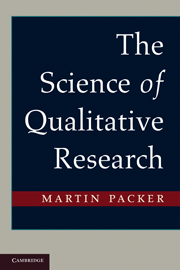Book contents
- Frontmatter
- Contents
- List of Figures and Tables
- List of Boxes
- Acknowledgments
- Introduction
- Part I The Objective Study Of Subjectivity
- Part II Ethnographic Fieldwork – The Focus On Constitution
- 6 Calls for Interpretive Social Science
- 7 Dualism and Constitution
- 8 Constitution as Ontological
- 9 The Crisis in Ethnography
- 10 Studying Ontological Work
- Part III Inquiry With An Emancipatory Interest
- References
- Name Index
- Subject Index
10 - Studying Ontological Work
- Frontmatter
- Contents
- List of Figures and Tables
- List of Boxes
- Acknowledgments
- Introduction
- Part I The Objective Study Of Subjectivity
- Part II Ethnographic Fieldwork – The Focus On Constitution
- 6 Calls for Interpretive Social Science
- 7 Dualism and Constitution
- 8 Constitution as Ontological
- 9 The Crisis in Ethnography
- 10 Studying Ontological Work
- Part III Inquiry With An Emancipatory Interest
- References
- Name Index
- Subject Index
Summary
[T]hese theories presuppose the prior existence of the question that they are seeking to resolve: that there is a yawning gulf separating the agent from structure, the individual from society. Now if there is no gulf, then sociological theory would find itself in the rather odd situation of having tried to provide ever more refined solutions to a nonexistent problem.
Latour, 1996, p. 232If constitution goes on in the everyday practices of a form of life, then it makes sense that to answer questions about constitution we need to study these practices. One way would seem to be firsthand contact with the form of life through ethnographic fieldwork, but, as we have seen, ethnographic accounts that claim to describe what is “behind” everyday actions and events such as the cockfight, which are written for outsiders and are immediately removed from the form of life they represent, face insuperable problems of veracity. When fieldwork is understood as participating as a member and then writing a disinterested description of the order of a form of life, it is inherently dualistic.
Are there other ways to study practices? It might be objected that in considering only ethnography I have been unduly narrow in my exploration of the ways in which we could study constitution. Certainly other methods and conceptual frameworks exist for the study of practical interaction. In this chapter, I want to consider two of them, both of which are, at least ostensibly, focused on exploring the relationship of constitution between individual and society, between member and form of life. These two are critical discourse analysis (CDA) and conversation analysis (CA).
- Type
- Chapter
- Information
- The Science of Qualitative Research , pp. 245 - 268Publisher: Cambridge University PressPrint publication year: 2010



